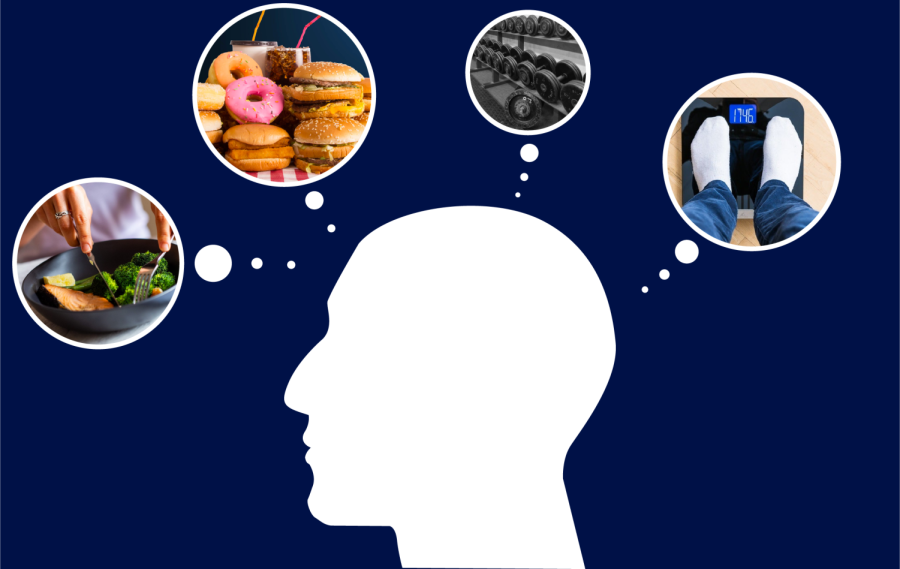Diet culture impacts students as holidays approach
Nov 1, 2021
As the holidays approach in upcoming weeks, students begin to anticipate certain holiday meals and dishes. While the thought of coming home to a Thanksgiving feast complete with turkey and mashed potatoes will excite many students, it is a source of great struggle and anxiety for others.
Similar to other college campuses, students at the University struggle with diet culture and their relationships with food, and this tends to be heightened with the change in season.
“It is not uncommon for the holidays, which often involve a great deal of food, to be distressing to students who struggle with disordered eating,” said Ian LeSueur, psychologist at the Counseling Center. “While we may not necessarily see an increase of students presenting to the Counseling Center with eating concerns, we do often see an increase in distress for those students that are being seen with us as it relates to the holiday season.”
While disordered eating and diet culture has been present on college campuses for a long time, there has been an increase since COVID-19. Ashley Peters, dietician at McKinley Health Center, said the rate and severity of eating disorders has increased since.
“Since COVID particular, the rate of eating disorders have gone up considerably,” Peters said. “We are noticing a spike there and a spike with students relating to unhealthy relationships with food and their bodies.”
Get The Daily Illini in your inbox!
Despite COVID-19 playing a role in the increase of eating disorders and related issues, students have struggled before now. On college campuses in particular, students are at greater risk due to vulnerability and limited food choices, LeSueur said.
“Diet culture is a societal issue, and I think you will find high rates of body image concerns and disordered eating behaviors on most college campuses,” LeSueur said. “A lot of college students feel pressured to fit in, look a certain way, do well academically and are often start to explore romantic relationships. All of this can have a significant impact on a person’s body image and self-esteem.”
For some students, going home and being with family and friends can be a major source of support and comfort, but it might be a period of struggle and anxiety for others.
“Sometimes going home is one of the best things that can happen to my students because their support and communication is there,” Peters said. “However, it could also be a stressful time where the dynamic isn’t very good. That is just a student-to-student individual thing.”
LeSueur said families also tend to have an influence on student’s relationships with food and their bodies. Depending on the home you come from and the attitudes that family members hold, this could cause further issues.
“When you are growing up, you typically do not have control over your portions or what types of food you eat, so it can be easy to model your parents’ behaviors around food,” LeSueur said. “More often than not, students coming into the Counseling Center with disordered eating or body image concerns have at least one parent who either struggled with disordered eating themselves or who regularly told the student negative things about their body shape and size or how much they were eating.”
For students who don’t have a negative relationship with food because of a parent, it is still clear that families influence the way one feels about food and their diet. Madelyn Blandford, junior in ACES, had a major change in her family’s relationship with food as her mom went on a weight loss journey.
“Growing up, my family didn’t really eat the healthiest, but my parents always made sure we had a fruit or vegetable on our plate,” Blandford said. “(My mom’s weight loss journey) shaped my relationship with food. It’s listening to your body, but also knowing the limit and listening to the intuition of what makes your body feel good or bad.”
At the University, there are resources for students to utilize if they find themselves struggling with these problems. Through McKinley Health Center, the “Making Peace with Your Plate” campaign aims to inform students and help them evaluate if they should seek out help from dieticians at McKinley or other health services.
Additionally, as students come home for fall and winter break, it is important to have support. Depending on the student’s comfort and at-home dynamic, having people to talk to about these feelings can be helpful, said Michelle LeMay, co-chair of the Eating Disorders Treatment and Outreach Team.
“It would be helpful to have at least one or two trusted people that they can disclose to who can help them keep from engaging in disordered eating behaviors,” LeMay said. “It would help to be mindful of your hunger-fullness scale and only eat to the point of pleasantly satiated.”
From student to student, the relationship and emotions that come with the holidays and food has great range. It is important to honor your body and do what makes you feel healthiest, Blandford said.
“I think the main thing that I would like people to think about is continuing to fuel your body,” Blandford said. “Whether that is with your chicken and dumplings or a chicken Caesar salad. Food is still food whether it is the holidays or not.”






